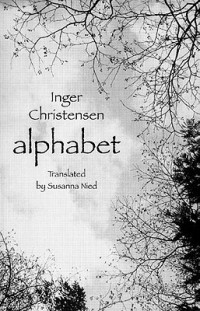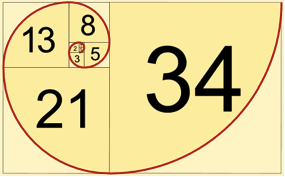 alphabet
alphabet
by Inger Christensen
New Directions, 2001
64 pages / $12.95 buy from Amazon
0. Inger Christensen—that petite, Danish demigod with her propensity for potted plants and the wild unknown—must have been hounded by the idea of growth. By what is massive. I guess if you look at/dwell on the vastness of things for long enough, you’ll predictably find yourself engaged with death options, the tempered dark where there are no underthings to stabilize you—and you are a little dust, alone with the chilling and the growing of yourself. It’s just you you you and the big outside.
1. Christensen’s alphabet is a sprawling network, shaped by the Fibonacci sequence that signifies nature’s inclination toward animal, exponential levels of growth and similar vanishings of decline. There’s an incantation stitching the poem, especially its beginning, that simply verifies the existence of things:
killers exist, and doves, and doves;
haze, dioxin, and days; days
exist, days and death; and poems
exist; poems, days, death
Death exists, details exist, the small monotony of days exist, all alongside one another.
1. I once read the entirety of alphabet in one of those concrete courtyards, the sad kind that’s trying to cute-up a hospital. I read it another time out loud for someone (although finishing was weird and uncomfortable because I was just beginning to tell, although I liked this person at the time, that they were not really interested in me and definitely not interested in 80-page metaphysical poems structured like the Fibonacci sequence), and another time on my bedroom floor with a whole .75 of OT that was looking nothing like a group sport because I was sad about something or something. And many times before and after that I can’t remember anymore. One magical person said, when I asked her about alphabet, that it made her think about cornfields a lot.
2. I sometimes try to relate my deep affection and appreciation for the state of Iowa, and I always think about cornfields that continue past the curvature of the earth, this massive output of production that literally exceeds our capacity to see it, much less understand it. “wheat in wheatfields exists, the head-spinning / horizontal knowledge of wheatfields, half-lives, / famine, and honey . . .”
3. Sometimes all it takes to be humbled is just the existence of certain things.
5. I’m shocked and quieted every time I read a newspaper, but not like I am by cornfields or incomprehensibly vast networks of connection. Although, the more I think about alphabet and re-live those declarations of both physical and metaphysical existences, the less I see the distinction.
8. There are some lines in there that simply state the death count for some great tragedies— “140,000 dead and / wounded in Hiroshima / some 60,000 dead and / wounded in Nagasaki”— and these numbers stand still on the page. The lines are always wavering between the porous and the immovable, the intimate and the intergalactic.
13. I wonder what it would look like, speaking of networks of connection, if Christensen had written a long poem/book of poems about the internet. Like, would that be beautiful? Would that be sheer terror?
21. It’s impossible not to talk about Susanna Nied’s translation. In an interview at Circumference last year, Neid said that she started working on alphabet’s translation in secret: “I didn’t tell Inger I was doing it. For the time being, I didn’t want anyone else’s input, not even hers. I had a very strong sense of what the poems could become in English. I kept shaping and reworking. Interlinked sprials. Double helix. Beauty and destruction. I was possessed.”
34. You can easily be possessed by Christensen. If you hear alphabet being read aloud, the words bend towards rapture, like hypnotism. Partly due to the steadily revolving repetitions—existence, vanishing, existence, vanishing.
55. In the Fibonacci sequence, the ratio between any two consecutive numbers in the sequence equals the Golden Ratio, so that each progression is mathematically equal. I don’t know if this is just projection, but the turn of the words seems to be spiraling outwards. The words get you trance-like, envisioning:

89. I also think of what critics said about Malick’s The Tree of Life after it came out, about how it was awe-inspiring and refreshing in its sheer ambition. Here’s A.O. Scott: “Very few contemporary filmmakers venture so boldly or grandly onto the primordial terrain of philosophical and religious inquiry where the answers to basic and perennial questions seem to lie. Why are we here? How do we know? What does it mean?”
144. I never saw The Tree of Life— I’m not all that visually inclined and what I heard didn’t appeal to me. But I am hard-pressed to think of contemporary writers who are addressing those sweeping, “primordial” questions. You get littered with micro-stories, the habitat of a single person, watching them so close that you can see the patterns on their clothes. Literary gossip, psychic limits on all sides. I’m not saying that those stories can’t be valuable. But I do think that you can get locked into your own little planet that way, dwelling safely behind the opaque cloud cover that is everybody and everything else.
233.Christensen is deeply involved with those questions and allows them to gently expand before you, blooming slowly—0, 1, 1, 2—and then wildly accumulating. She writes: “high-speed, hyacinthic in its decay, life, / on earth as it is in heaven.” Water hyacinths, those luminous pests, have been known to double their population in two weeks. This is nature, obviously—blooming to excess, dying in excess.
377. This accumulation, this hurdling god-scope, can position you on the hyacinthic, wide lens that Christensen imagines as the human experience. She’s ready to confront that you and she are little eyelashes in that vastness: “small beings / we will exist, small as pollen bits in peat, / as virus bits in bones, / as water-thyme perhaps . . .”
610. But you still see her cooking potatoes in her kitchen, a single breath or flesh of a dream. She is small, but present.
987. The poetic frame can sometimes be a place to put words and leave them, not think about them. Suffice to call it an abstraction. But Inger Christensen’s desire to imperialize and exalt the banal but also the astronomical and godlike, and to do so side-by-side, seems like a reversal of that effect. Like you suddenly are forced to think about what these things mean, and why someone would bother to write a poem that is literally just ”apricot trees exist, apricot trees exist.” Of course they exist. But how often do you think about it? How often do you starkly confront the existence of yourself?
1,597. And she starts to force you to consider your ineptitude, your permanent helplessness that is just a condition of being born or being alive, because you can’t stop the destruction of beautiful things and that is not being defeatist or self-effacing because that is just a fact. “Guns exist.” “Atom bombs exist.” “Death exists.”
2,584. And in weaving these blunt, brutal, declarative facts with beautiful poetics, she’s able to force you to think about the dualities that are constantly present but that you never think about because their separations have been so institutionalized. Which is a cool trick and also really political. Like, you can write a story that spans immeasurable continents of time and black space and still be writing, deeply and directly, about the minute and blinking moment of your life.
4, 181. As if to dare that life to inhabit such space.
6,765. I hesitate to write the last lines, but here they are (they’ll kick you in the chest; defend yourself):
mutely observed only by a hareas if they were children in a childhood’s
fairy-tales they hear the wind tell
of the burned-off fields
but they are no children
no one carries them any more
10,946. It’s hard to know what to say, but I do think that there’s something to it about how the world will go on without you. No one will carry you. This means that a lot of the things you love will survive you, only to be destroyed or ruined—for someone, the color of a sunset will, as Christensen writes, “recall atomic fire.”
17,711. I’ve been feeling real solastalgic lately in relation to my childhood home, wondering at the irreparable nature of time-change, time erosion. And in re-reading her, it’s easy to see how Christensen hides some really horrifying truths in alphabet, like death posed as not a subject, but an inevitability. You’re “bound to fragile flesh like / particles of soot bound to soap.” And you’d expect its reminder to be disorderly and scary. But it’s not like she’s out to make you feel inconsequential and bad about your life; it turns out that the humbling and awe-inspiring effect of decay is kind of intoxicating and maybe even validating. It reminds you of what you’re a piece of, because decay can be reassuring. As things decay, they bring their equivalents into being.
28,657. Or maybe you can just be constantly devastated by it all, I don’t know.
46,368. I know someone who likes to pencil in little ellipses at the ends of books that really stun them. That little punctuation of silence, extending the book into the reader’s hand. The way I see it, poetry needs to be perceived as necessary for its survival—and not with some vague, floaty understanding of “necessity,” but as something truly urgent. Silence coaxed out of a sense of awe strikes me as being real urgent. There’s, of course, a humbling quality in wanting someone else’s voice to ring on through your head, to let it continue to occupy that space. To let it cry somewhere inside you for people and things that you don’t know, but that exist, somewhere. Retreating fast—too fast, it seems—into their vanishings. But you reach towards the undergrowth where all things are decomposing, quiet in their tiny histories, and converging into this enormous history of (non)existence. The decaying ground meets your car meets your house meets your desk meets your computer where you are typing something and so am I. More than anything, you feel seen. . .
Tags: 25 Points, alphabet, inger christensen, New Directions
